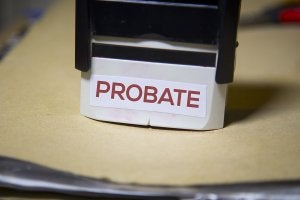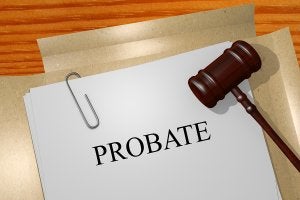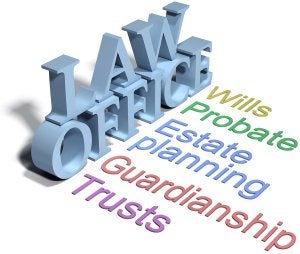-
Authenticating a Will Through Probate
When an executor probates a will in Houston, part of the probate process involves the authentication of the will. In many cases, the will is authenticated without a problem. Occasionally, a party in interest will challenge a will. The act of contesting a will means that one or more individuals have reason to believe that the will is invalid. Where such contested probate litigation is successful, the result may be a change in the distribution of the decedent’s estate.

Many people choose to create numerous wills throughout their lifetime to reflect their changing life circumstances. In most cases, the most recently drafted will is considered to be the Decedent’s true last will and testament. If the most recent will fails to comport with the requirements for a valid will, then the executor may have to revert to the second most recent will. A will may fail to be authenticated, or admitted to probate, because it was not created in a legally acceptable form; it was not witnessed properly; or the decedent did not have the mental capacity to understand the provisions of the will at the time of its creation.
-
What Happens to Stocks When the Owner Is Deceased?
It is likely that the stocks of a deceased owner will have to go through the probate process, but it’s best to consult a probate lawyer in Houston to confirm this. If stocks are jointly owned or titled “transfer on death,” then the designated survivor can simply redeem the stocks without the need for formal probate. Otherwise, the executor of the will must file the will with the court and then receive court-issued letters testamentary to validate his or her authority to transfer ownership of stock shares.
Oftentimes, the executor of the will then set up a separate estate account and re-register the stocks in the name of the estate itself, rather than the decedent. If the will specifies that the stocks are to go to one or more specific beneficiaries, the stocks can usually be transferred to those individuals unless the assets must otherwise be used to satisfy the liabilities of the estate. In some cases, the executor may need to obtain a court order to use the stocks in this manner. Otherwise, the stocks can simply be liquidated and the funds deposited into the estate account.

-
What to Expect from the Probate Process
The probate process is perhaps among the least understood aspects of estate planning. It can be complex and it may be a prolonged matter that takes months to complete. However, the steps of the process can actually be clearly defined. When you hire a probate lawyer serving The Woodlands, he or she will explain the probate process to you and answer any questions you may still have.
File the Petition

The first step in the probate process is to file a petition in probate court and provide notice to the heirs. If the individual died with a will, then the petition will seek to admit the will to probate and appoint the executor. If the individual died intestate, the petition will seek to appoint an administrator for the estate. All of the heirs and beneficiaries will be provided with notice and a notice about the probate hearing will usually be published in the local newspaper. This allows beneficiaries to voice objections in court.
Give Notice and Take Inventory
Once the executor is appointed by the court, he or she must notify all creditors of the estate. Creditors must make a claim within a certain period of time. Then, the executor will take an inventory of the estate property. The inventory includes real property, stocks, business interests, and other assets. The estate may need to hire an independent appraiser to assess the value of non-cash assets.
Pay Claims
The next step in the probate process is to pay claims. The executor will determine which claims against the estate are legitimate. Those will be paid and other expenses, such as funeral expenses, will be paid. It may be permitted to sell estate assets if this is necessary to pay these obligations.
Distribute Property
Once all legitimate claims have been satisfied and the waiting period to file claims has expired, the executor will ask the court for the authority to transfer the remaining assets. If the individual died with a will, the assets will be transferred in accordance with those specifications. If the individual died intestate, the assets will be transferred in accordance with the state intestate succession laws.
-
How Are Heirs Determined in Texas?
When a family member passes away, the surviving relatives must turn to a will or a probate court to determine how the deceased’s property should be distributed. To receive property, in the absence of a will, Texas probate law requires that you prove that you are a legitimate heir. To go through this process, it is often helpful to hire a probate lawyer in The Woodlands to assist with your case. Here is what you need to know about establishing yourself as an heir under Texas probate law.
Wills

A will is the most straightforward way to determine who is a legitimate heir. If there is a will in place, and no one contests it, then the will should state very clearly who the deceased intended to be an heir to his or her estate. If someone is not named as an heir in the will, then it is not possible to prove in court that he or she has a legitimate claim on being an heir without challenging the will. Challenging the will means proving that there is a legal reason it should not be considered binding.
Heirship Applications
If there is no will in place, then the estate will be decided in probate, and everyone who believes he or she should be considered an heir must file an application. Before heirship applications can be accepted, the potential heirs must establish that the deceased died without a complete will and that he or she had property in the state of Texas. There must also have been no administration of the estate, or, in cases where there was will, property must have been left out of the will. If these requirements are met, the applications for heirship can be submitted in a county in which the deceased owned property. The applications request information about the potential heirs and their relationships with the deceased. All potential heirs must sign the application, and if there are heirs that cannot be located, an ad must be placed in the paper to attempt to locate them. The court then uses this information to determine how to allocate the estate appropriately.
-
What to Know About a Probate Bond
When an individual goes to a probate lawyer to have a will drafted, the document will almost certainly waive the requirement of a probate bond . But in some cases, it is a requirement to obtain a probate bond in The Woodlands unless your probate lawyer successfully argues against it. When a probate bond is issued, its purpose is to offer protection to the heirs and creditors of the decedent specifically from the negligent or intentionally wrongful acts of the executor or administrator.
For example, an executor might decide to retain all of the funds in an estate for him- or herself instead of distributing them among the creditors and other heirs. The existence of a probate bond allows the creditors and heirs to recover the amounts they are entitled to despite this act of malfeasance. Although a probate bond seems to be desirable, in most situations it actually creates more problems than it solves. This is because obtaining a substantial probate bond can be costly and not everyone will be qualified to do so. The funds from the estate cannot be used to pay for the probate bond simply because these funds are inaccessible until the bond is already obtained.

-
Meeting with Your Probate Attorney
The probate process in The Woodlands is complex. It’s best to hire a probate lawyer to handle these complicated matters for your family. Taking a few minutes to prepare will help you get the most out of your meeting with the probate lawyer . For example, consider your answers to the following questions discussed in this featured video.
This legal professional suggests that your probate lawyer will ask you exactly which services you need him or her to perform. A probate attorney can prepare wills and living wills, revoke previous wills or trusts, and handle contested wills. You should also consider what your role in this matter is. For example, are you the executor or an heir? It’s also a good idea to prepare a list of questions you want to ask the attorney during your meeting.
-
What Probate Attorneys Do
Your family may want to speak with a probate attorney in The Woodlands after the passing of a loved one . A probate lawyer handles the administrative process of settling the decedent’s affairs. It’s commonly thought that probate is a lengthy and arduous process, but in fact, probate lawyers commonly succeed int making the process relatively easy for the surviving family members.
You can watch this video to hear a little more about what a probate attorney can do for your family. This legal professional explains that the probate lawyer may pay the decedent’s debts and taxes from his or her estate, take an inventory of the assets, and oversee the distribution of assets to the beneficiaries. Probate attorneys can also handle disputes among heirs regarding inherited property.
-
Why You May Need a Living Trust
If you do not yet have a living trust , consider talking to a probate attorney near The Woodlands about whether this arrangement might benefit you. When you create a living trust, you can name yourself as the trustee to remain in full control of any assets you transfer into the trust. You can use the trust to pass on assets to your heirs after your death. One main benefit of having a probate attorney establish a living trust for you is that any property that remains in the trust at the time of your death will not go through the probate process. This means that if your heirs need financial resources right away after your passing, they can have access to them without waiting for the estate to be closed.
In some cases, it is more difficult to challenge a living trust than to challenge a will. If someone challenges the validity of a living trust, he or she would need to prove that you were mentally incompetent at the time the trust created or perhaps that your signature was forged. Generally, the fact that you continued to manage the trust after you created it is sufficient proof of your mental competence. However, be aware. There are often very good reasons not to create a trust for your properties. For example, the “taxable basis” of your trust property may be different than what it would be if the property were inherited in a simple probate case, so consult with a lawer prior to creating such an instrument without proper counsel.

-
Answers to Common Questions about Wills and Probate
 Wills and probate are important aspects of the legal process involved in wrapping up a deceased person’s estate. Because going through and untangling an estate can be confusing, it helps to retain a probate lawyer near The Woodlands to walk you through the process. Having a probate lawyer handle the case can help you avoid unnecessary delays and minimize conflict. These answers to common questions about probate will help you understand what to expect.
Wills and probate are important aspects of the legal process involved in wrapping up a deceased person’s estate. Because going through and untangling an estate can be confusing, it helps to retain a probate lawyer near The Woodlands to walk you through the process. Having a probate lawyer handle the case can help you avoid unnecessary delays and minimize conflict. These answers to common questions about probate will help you understand what to expect.How Do I Know If Probate Is Necessary?
Not all estates are required to go through probate. For instance, community property can transfer to a surviving spouse and life insurance proceeds can be paid to the specified beneficiary without probate in Texas. Small estates, in which there is no will and the value of the estate is less than $50,000, can often skip probate court, so long the beneficiaries agree on the distribution of property and sign an affidavit to that effect. Even if you believe you do not need probate court, it is still advisable to have a probate lawyer review your case to ensure the estate is being handled appropriately.What Are the Different Types of Probate?
The most common type of probate in Texas involves the “independent administration” of the estate. During this type of probate, an executor who is either named in the will (or unanimously nominated by all beneficiaries) supervises the process of handling the affairs of the estate. Once approved as an independent administrator by the Court, he or she can act independently to pay outstanding debts, sell property attached to the estate, and distribute assets to beneficiaries without obtaining court approval for each step. The second kind of probate is the often maligned “dependent administration.” It is less common because it requires the court to become more involved in the probate process by approving actions by the executor each step of the way.What Role Does the Will Play In The Probate Process?
An uncontested will can make probate simple if it properly provides direction for estate administration including authorizing an independent administration. If there is no will, or if the authenticity of the will is challenged, or whenever the beneficiaries dispute the terms of the will, then a probate lawyer can provide both legal direction as well as representation in probate court. -
Understanding Probate Litigation
Probate is the process of settling a deceased person’s will and requires the services of a probate lawyer in the Woodlands. A probate lawyer can ensure the process is as smooth and efficient as possible, even in the event that a will is contested.
Probate litigation involves resolving a will contest. A probate lawyer may authenticate a will if a person believes that it was improperly drafted or was created under suspicious circumstances. A lawyer is also necessary where the heirs are disputing the terms of a loved one’s will and need protection of their legal rights and claims to property or possessions. A probate lawyer can also help determine the rightful heirs in the absence of a will. If someone passes away without drafting a will, your attorney will appear in probate court to assisting in determining what your proper entitlement is under law. Of course, the best way to avoid probate litigation is to hire a will lawyer to draft a will while you can still make your wishes known.

RECENT POSTS
categories
- Uncategorized
- Estate Planning
- Probate
- Family Law
- Drafting a Will
- Divorce Lawyer
- Texas Family Law
- Divorce
- Real Estate
- Probate Court
- Child Custody
- Andrew J. Bolton
- Esq.
- Adoption
- Law Office of Andrew J. Bolton
- Wills
- Executor
- Infographic
- Guardianship
- Trusts
- Contested Divorce
- Child Support
- Attorney
- Living Wills
- Contested Will
- Prenuptial
- Probate Bond
- Heir Apparent
- Legacy Contact
- Living Trusts
- legal guardian
- Legal Disputes
- property rules
- Common Law
- Stocks
- Estate Tax
